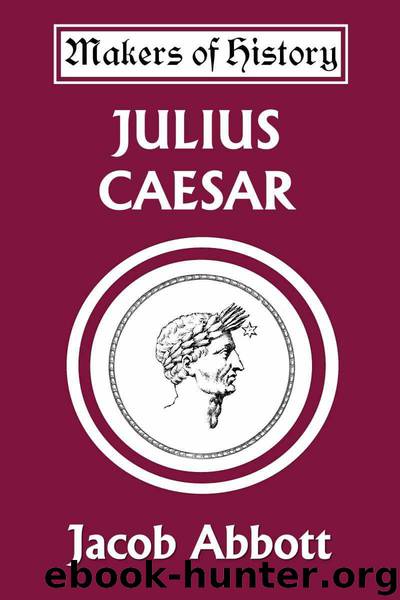Julius Caesar (Yesterday's Classics) by Abbott Jacob

Author:Abbott, Jacob [Abbott, Jacob]
Language: eng
Format: epub
Tags: Biographies
ISBN: 9781599151410
Publisher: Yesterday's Classics
Published: 2010-11-14T14:35:25.446000+00:00
CHAPTER VII
The Battle of Pharsalia
THE gathering of the armies of Cæsar and Pompey on the opposite shores of the Adriatic Sea was one of the grandest preparations for conflict that history has recorded, and the whole world gazed upon the spectacle at the time with an intense and eager interest, which was heightened by the awe and terror which the danger inspired. During the year while Cæsar had been completing his work of subduing and arranging all the western part of the empire, Pompey had been gathering from the eastern division every possible contribution to swell the military force under his command, and had been concentrating all these elements of power on the coasts of Macedon and Greece, opposite to Brundusium, where he knew that Cæsar would attempt to cross the Adriatic Sea. His camps, his detachments, his troops of archers and slingers, and his squadrons of horse, filled the land, while every port was guarded, and the line of the coast was environed by batteries and castles on the rocks, and fleets of galleys on the water. Cæsar advanced with his immense army to Brundusium, on the opposite shore, in December, so that, in addition to the formidable resistance prepared for him by his enemy on the coast, he had to encounter the wild surges of the Adriatic, rolling perpetually in the dark and gloomy commotion always raised in such wide seas by wintery storms.
Cæsar had no ships, for Pompey had cleared the seas of every thing which could aid him in his intended passage. By great efforts, however, he succeeded at length in getting together a sufficient number of galleys to convey over a part of his army, provided he took the men alone, and left all his military stores and baggage behind. He gathered his army together, therefore, and made them an address, representing that they were now drawing toward the end of all their dangers and toils. They were about to meet their great enemy for a final conflict. It was not necessary to take their servants, their baggage, and their stores across the sea, for they were sure of victory, and victory would furnish them with ample supplies from those whom they were about to conquer.
The soldiers eagerly imbibed the spirit of confidence and courage which Cæsar himself expressed. A large detachment embarked and put to sea, and, after being tossed all night upon the cold and stormy waters, they approached the shore at some distance to the northward of the place where Pompey's fleets had expected them. It was at a point where the mountains came down near to the sea, rendering the coast rugged and dangerous with shelving rocks and frowning promontories. Here Cæsar succeeded in effecting a landing of the first division of his troops, and then sent back the fleet for the remainder.
The news of his passage spread rapidly to all Pompey's stations along the coast, and the ships began to gather, and the armies to march toward the point where Cæsar had effected his landing.
Download
This site does not store any files on its server. We only index and link to content provided by other sites. Please contact the content providers to delete copyright contents if any and email us, we'll remove relevant links or contents immediately.
| Africa | Americas |
| Arctic & Antarctica | Asia |
| Australia & Oceania | Europe |
| Middle East | Russia |
| United States | World |
| Ancient Civilizations | Military |
| Historical Study & Educational Resources |
The Mysteries of Mithra by Cumont Franz(1352)
The Fall of Carthage by Adrian Goldsworthy(1301)
Sacred Britannia: The Gods and Rituals of Roman Britain by Aldhouse-Green Miranda(1146)
Letters from a Stoic (Classics) by Seneca(1028)
The Ghosts of Cannae: Hannibal and the Darkest Hour of the Roman Republic by Robert L. O'Connell(978)
Selected Political Speeches by Marcus Tullius Cicero(970)
The Satyricon by Petronius(970)
Fall of the Roman Republic (Penguin Classics) by Plutarch(962)
The Poison King: The Life and Legend of Mithradates, Rome's Deadliest Enemy by Adrienne Mayor(956)
Rubicon: The Triumph and Tragedy of the Roman Republic by Tom Holland(938)
Rome's Gothic Wars: From the Third Century to Alaric by Michael Kulikowski(931)
Hadrian and the Triumph of Rome by Everitt Anthony(879)
The Roman History by Cassius Dio(862)
In Defence of the Republic by Cicero(861)
Delphi Complete Works of Cicero by Cicero(815)
Letters from a Stoic by Seneca(807)
Marcus Aurelius by John Sellars(792)
The Spartacus War by Strauss Barry(790)
The Twelve Caesars (Penguin Classics) by Suetonius & Robert Graves(767)
